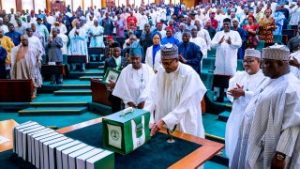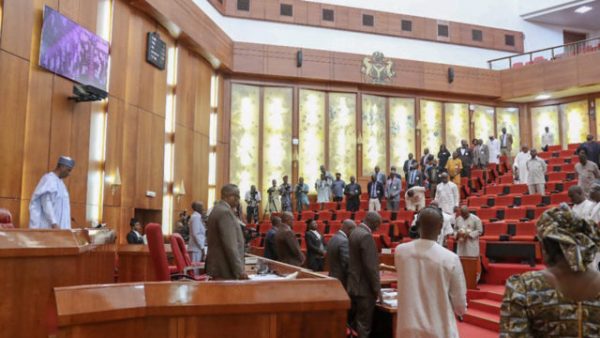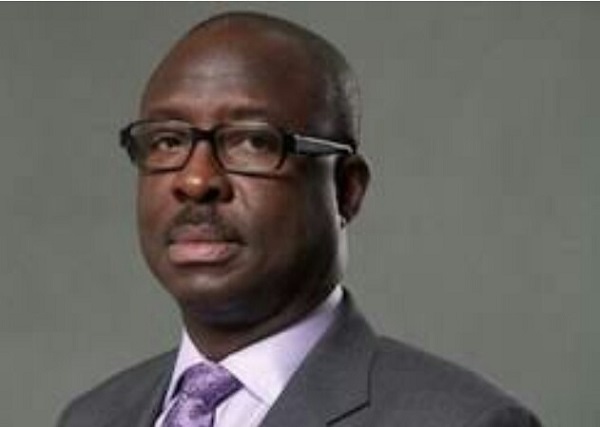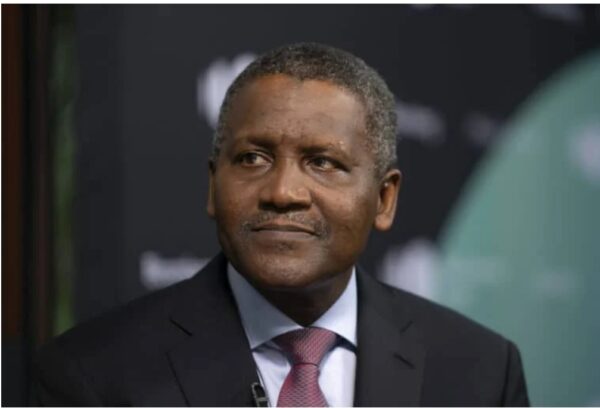Debt servicing takes N2.7tn as National Assembly passes N10.6tn budget
 APC, NECA, LCCI commend timely passage of budget
APC, NECA, LCCI commend timely passage of budget
The Senate and the House of Representatives on Thursday concurrently passed the 2020 Appropriation Bill, raising the total estimates from the proposed N10.33tn to about N10.6tn.
The passage followed the consideration and unanimous adoption of the reports by the Senate and House Committees on Appropriations on the bill.
The bill passed the third reading after the report was adopted.
The National Assembly put a clause in the bill that it runs from January 1, 2020, bringing Nigeria back to a January-December budget cycle.
Of the new total sum of N10.59tn, the parliament raised Statutory Transfers from the proposed N556.7bn to N560.47bn; raised Debt Service from N2.45tn to N2.73tn; reduced Recurrent (Non-Debt) Expenditure from N4.88tn to N4.84tn; and increased Development Fund for Capital Expenditure from N2.14tn to N2.47tn.
As part of the N264bn increment, the National Assembly raised its own budget from N125bn to N128bn.
Also under Statutory Transfers, N37.83bn for the North East Development Commission was raised to N38.1bn.
Constitution review is to cost N1bn; Federal Government intervention in Zamfara, Katsina and Borno is to cost N1.5bn; and Office of the National Security Adviser’s Falcon Eye Project is to cost N25bn.
At the Senate, Chairman of the Committee on Appropriations, Barau Jibrin, while presenting the report, said the increment by N264bn allowed for interventions in critical areas such as national security, infrastructure, mines and steel development, health care, among others.
He said the daily oil production stood at 2.18 million barrels per day, oil benchmark was increased from $55 to $57 per barrel as proposed by the executive, while the exchange rate remained N305 to a dollar.
Addressing journalists after the passage, Chairman of the House Committee on Media and Public Affairs, Mr Benjamin Kalu, said the National Assembly had broken the jinx on timely passage of national budget.
Kalu, while responding to a question on timely transmission of the budget to the president for assent, noted that the House was already working on his bill seeking to create a deadline for transmission of bills passed by the National Assembly.
The lawmaker, while defending the increment of the budget size, said it was based on the demands by the ministries, departments and agencies while appearing before legislative committees for budget defence.
Kalu said, “I have assured you that we are not a rubberstamp House like many people thought; that this legislature, where we feel that the amount appropriated is low, we will up it. If there is one that we feel is too much, we will reduce it.
“You shouldn’t expect the budget to just come in and leave as it came. How do we justify the job we have been doing all the while? It shows that we actually looked at those numbers and we did some adjustments.”
APC, NECA, LCCI commend timely passage of budget
The All Progressives Congress, the Nigeria Employers Consultative Association, and the Lagos Chamber of Commerce and Industry commended the National Assembly for early passage of the budget.
NECA expressed hope that the move would bring the nation back to the January-December budget cycle that had been derailed over the years.
The Director-General, NECA, Mr Timothy Olawale, said, “We urge that this process would be finalised and the Appropriation Bill passed into law before January 1, 2020.”
Olawale observed that the budget was ambitious on recurrent expenditure as the payment of the new minimum wage and servicing of public debt, “which has become bourgeoning, became critical factors.”
He said, “Although the capital vote is about 24 per cent of the total budget, its effect will only be felt with timely implementation.”
The NECA boss said even though Nigeria’s debt to GDP ratio was low compared to other African countries, the debt service to revenue ratio was very high.
Also, the Director-General, Lagos Chamber of Commerce and Industry, Mr Muda Yusuf, said the early passage of the budget would impact positively on budget implementation and the timely delivery of the expected outcomes.
He said it would reduce uncertainty that stakeholders had experienced with previous budgets.
The All Progressives Congress said it was elated at the early passage of the 2020 budget.
The party in a statement by its National Publicity Secretary, Lanre Issa-Onilu, commended both chambers of the National Assembly for putting national interest before any other interest.
It noted this was a clean departure from the 8th National Assembly which “used filibustering, political manipulation and other devious practices in their failed attempt to sabotage the APC government.”
Legal practitioner and Senior Programmes Officer, Human Rights Laws, a human rights organisation founded by ex-NBA President, Olisa Agbakoba, Collins Okeke, said the impact of the budget on the people depended on implementation.
He said, “It depends on how well the budget is implemented. If it is poorly implemented and appropriated funds are spent on benefits and entitlements of politicians and civil servants, the common man will not benefit.
“If the appropriated funds are spent on critical infrastructure roads, hospitals, the common man will benefit. Historically, we have spent on politicians and civil servants. I hope this budget will be different.”
The Lead Director, Centre for Social Justice, Eze Onyekpere, said the budget was not ambitious when projected growth rate was compared with the population growth rate.
He said in view of the fact that many Nigerians were still living in extreme poverty, Nigeria needed to sustain economic growth at not less than eight per cent per annum over a period of about 10 years.
A former Director-General of the Abuja Chamber of Commerce and Industry, Chijioke Ekechukwu, said that government should ensure there was fiscal responsibility and discipline in its expenditure.
He commended the President for sending the budget on time and the National Assembly for its speedy passage.
Ekechukwu said one of the implications of having a January to December budget cycle was that investors would be able to make informed decisions based on the budget assumptions.







